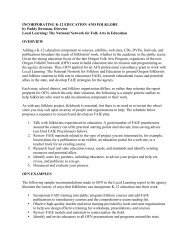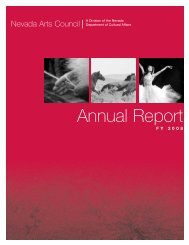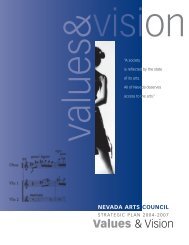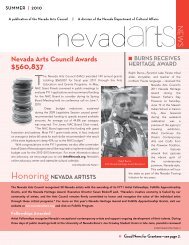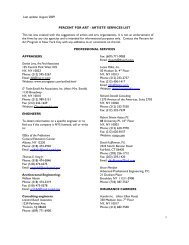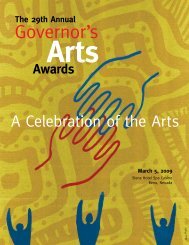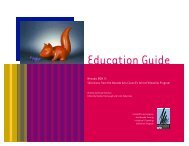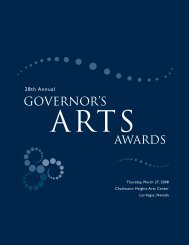Handed Down - Nevada Arts Council
Handed Down - Nevada Arts Council
Handed Down - Nevada Arts Council
Create successful ePaper yourself
Turn your PDF publications into a flip-book with our unique Google optimized e-Paper software.
1997–1998<br />
Scottish Bagpiping:<br />
John Massie and Wes Hallam<br />
Scottish pipe major John Massie and his apprentice<br />
Wes Hallam, both of Las Vegas, worked together<br />
for a second year in the apprenticeship program to help<br />
Wes progress to more technically difficult tunes and<br />
techniques. Wes entered several competitions in the<br />
novice category after his first year of intensive study, and<br />
says they were good experiences, if only for the things<br />
he learned from his mistakes. John says he practiced too<br />
much just before one contest, and his reeds got wet and<br />
“died on him.” “You can’t expect to walk in and win<br />
your first time,” John says philosophically.<br />
“Eventually when you’re reasonably seasoned the<br />
pipe becomes an extension of your own body,” he continues.<br />
“You never feel that you’re playing pipes. And<br />
that takes a long while to develop, it really does. A lot<br />
of practice, somebody telling you what to watch for, it<br />
doesn’t come natural. You hear some of these people s<br />
say, ‘Oh, I’m, self taught,’ and as soon as they say that,<br />
oh, I wince, don’t tell me that. Because it’s not an instrument<br />
that you can learn yourself properly. It’s got a<br />
history, it’s got a lot of pride. It’s a difficult instrument<br />
to play and master, no arguments about that.”<br />
This year John has moved Wes to what he calls<br />
“heavier-weighted” tunes, with more complex structures<br />
and fingering. He lets the student select the tunes<br />
he wants to learn. “I play them and then what he does,<br />
he selects one, and if I think he’s capable of handling<br />
that particular piece then that’s the one he’ll get. If<br />
I feel it’s a wee bit too heavy for him, then we’ll give<br />
him something in between to build up to that particular<br />
level, then we’ll do it. You find, it’s the same with<br />
anything, that if you like that particular piece of music,<br />
you’ll learn it a lot quicker. If you find yourself a piece of<br />
music you don’t like, then you start to fight it, and you<br />
never learn it properly, ‘cause you don’t want to play it.<br />
The same as anything else.” It’s a simple but effective<br />
and long-proven theory of teaching.<br />
Just learning to breathe properly in playing the pipes<br />
is an art in itself. And breathing techniques for the<br />
practice chanter, an oboe-like instrument, and the full<br />
pipes are completely different because the pipes require<br />
control of both the lungs and the arm. According to<br />
John, “When you go to the pipe, it’s got to be a controlled<br />
breathing, it’s not just you take a great big breath<br />
and you blow up the bag. That arm comes down while<br />
you’re taking your breath, and to maintain the pressure<br />
on the four reeds that are sounding [the chanter and<br />
three drones], you’ve got to blow them back up again.<br />
That’s what we call erratic blowing, if you’ve taken a big<br />
deep breath and you’re blowing it and your arm’s moving<br />
up and down, first thing that happens, your drones<br />
go out. Instead of getting a steady hum, you get wavering.<br />
If you blow too easy, then it stops and goes flat. So<br />
the blowing the bag is<br />
quite a high percentage<br />
of the sound.<br />
Wes surely has years<br />
more of learning on the<br />
pipes, a fact he rationalizes<br />
with an old saying,<br />
“seven years to a piper<br />
and seven generations to<br />
a master.” John laughs,<br />
“that’s an apprenticeship<br />
and a half!”<br />
John Massie<br />
John Massie and Wes Hallam<br />
play on their practice chanters.<br />
58




